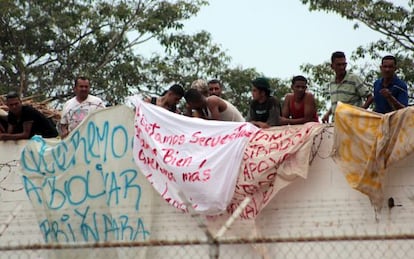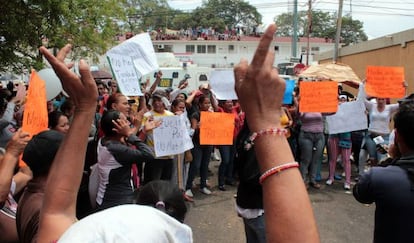Prison violence in Venezuela spins out of control, leaving government helpless
The Maduro administration cannot regain authority of the nation’s penitentiary system

A bloody clash between rival gangs that left 16 inmates dead inside one of Venezuela’s most dangerous prisons earlier this week is the latest indicator of how the government has completely lost control of the country’s penal system.
Homes that surround Maracaibo prison in northwest Venezuela were riddled with bullets that came from inside the overcrowded penitentiary. After the battle was over on Monday, a new leader emerged: Edwin Ramón Soto, known as El mocho Edwin, according to local newspapers.
Some of the inmates that died in the bloodshed had been dismembered and beheaded.
The news stunned Venezuelan Prison Minister Iris Varela, an official who rarely displays any emotion in front of television cameras. This time she was visibly affected by the incident.
“It was chilling to see how they took one life after another. They had no respect for each other,” Varela said.
Venezuela's prisons are marred by overcrowding and violence, and in many cases they are controlled by heavily armed gangs of inmates. This has made it difficult for prison guards and other security forces to control the large overflowing complexes across the country.
The Maracaibo prison has a capacity for 700 inmates but in real terms, according to NGOs, some 3,700 men are being held there.
Monday’s incident will not have come as a surprise to many Venezuelans, who have grown accustomed to inmate uprisings. In January this year, 58 prisoners died and more than 100 were injured when authorities tried to conduct a search at the Uribana prison in Barquisimeto. In August 2012, about 35 inmates were killed at the Yare 1 complex outside of Caracas after a clash between rival gangs.

According to official figures, 16,030 inmates were killed last year in Venezuelan jails – about 44 per day and 14.4 percent more than in 2011. Estimates predict that the murder rate will also increase by a similar percentage this year. Statistics by the NGO Venezuelan Prison Observatory show that nine out of 10 inmate murders go unpunished.
“The term lawlessness has never been more relevant than it is today to describe the current situation in Venezuela,” said sociologist Tulio Hernández in an interview with EL PAÍS.
In the period when the late Hugo Chávez governed (1995-2013), prison officials gave up their internal authority and allowed the inmates to assume control with their own medieval laws. Now the government of President Nicolás Maduro is making efforts to regain control but with poor results.
At the Sabaneta prison in Caracas, inmates built a pool so that they children could swim when they came for visits. The leader of the internal gang once hired a DJ and inmates converted an empty room into a disco with blaring music coming from gigantic speakers they had set up. Prisoners were armed with guns and knives and smoked marijuana freely.
The government was aware of what was happening but didn’t try to intervene because prison officers could barely get near the perimeter of the penitentiary.
Sabaneta has one of the largest prison populations in the country. At a facility that is supposed to hold 16,500 inmates, there are 52,933 prisoners in custody. As of July, 239 inmates have died behind bars at Sabaneta.
Opposition lawmakers blame Chávez for the deteriorating situation in the nation’s jails but that explanation is only half true. Even before Chávez came to government, the Venezuelan prison system was already exhibiting signs of crime and corruption. Prison guards were actively involved in providing inmates with weapons and other contraband, and the number of murders increased as gangs were formed inside the cells.
Varela, the prisons minister, has acknowledged that the government has full control of only seven of the 30 jails in the country.
Humberto Prado of the Venezuelan Prison Observatory said that any person who enters the system has a 44 percent chance of being killed inside.
Tu suscripción se está usando en otro dispositivo
¿Quieres añadir otro usuario a tu suscripción?
Si continúas leyendo en este dispositivo, no se podrá leer en el otro.
FlechaTu suscripción se está usando en otro dispositivo y solo puedes acceder a EL PAÍS desde un dispositivo a la vez.
Si quieres compartir tu cuenta, cambia tu suscripción a la modalidad Premium, así podrás añadir otro usuario. Cada uno accederá con su propia cuenta de email, lo que os permitirá personalizar vuestra experiencia en EL PAÍS.
¿Tienes una suscripción de empresa? Accede aquí para contratar más cuentas.
En el caso de no saber quién está usando tu cuenta, te recomendamos cambiar tu contraseña aquí.
Si decides continuar compartiendo tu cuenta, este mensaje se mostrará en tu dispositivo y en el de la otra persona que está usando tu cuenta de forma indefinida, afectando a tu experiencia de lectura. Puedes consultar aquí los términos y condiciones de la suscripción digital.








































